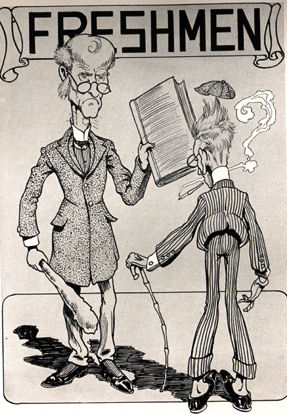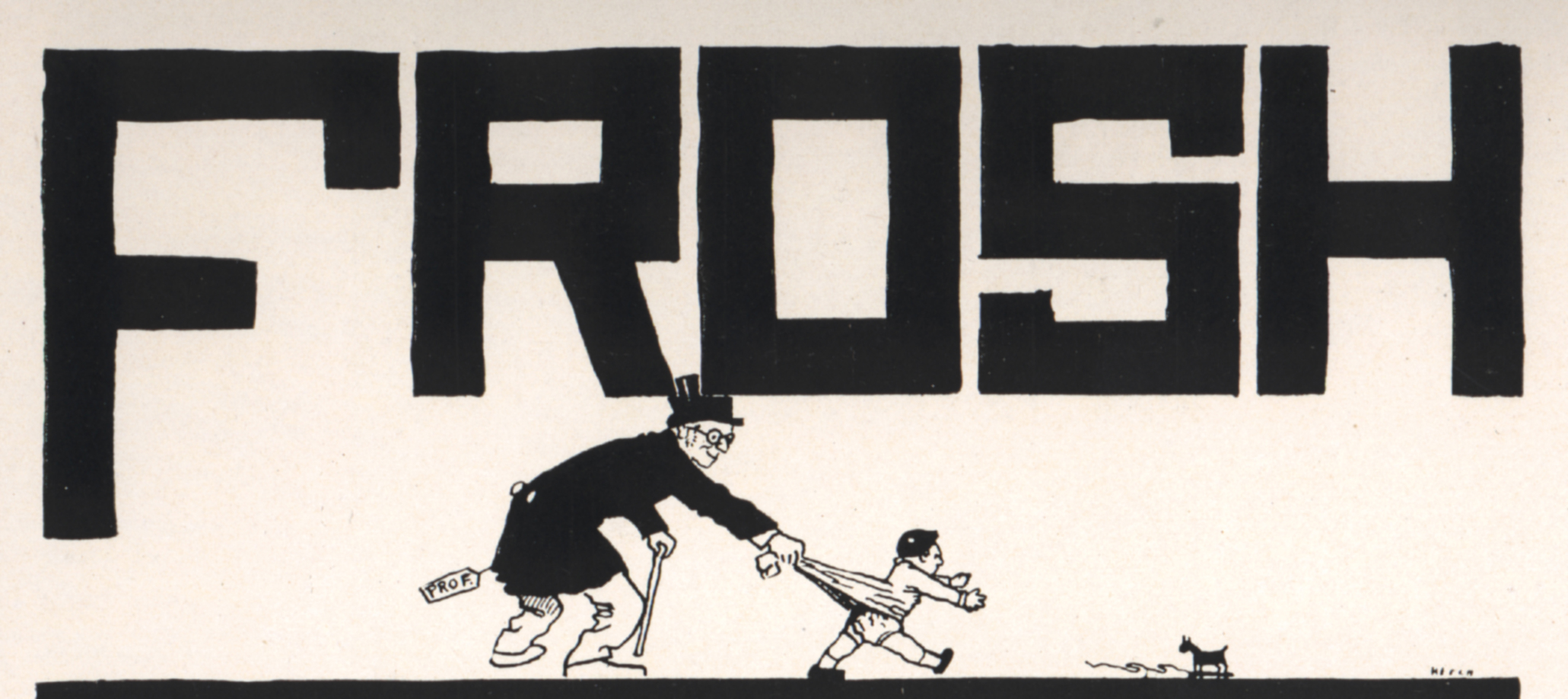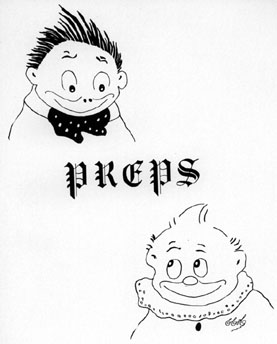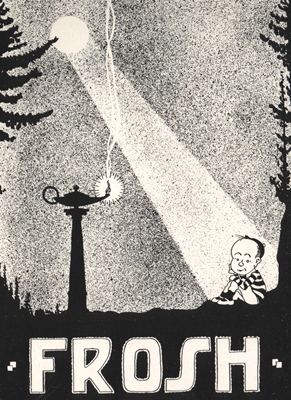1916-1925
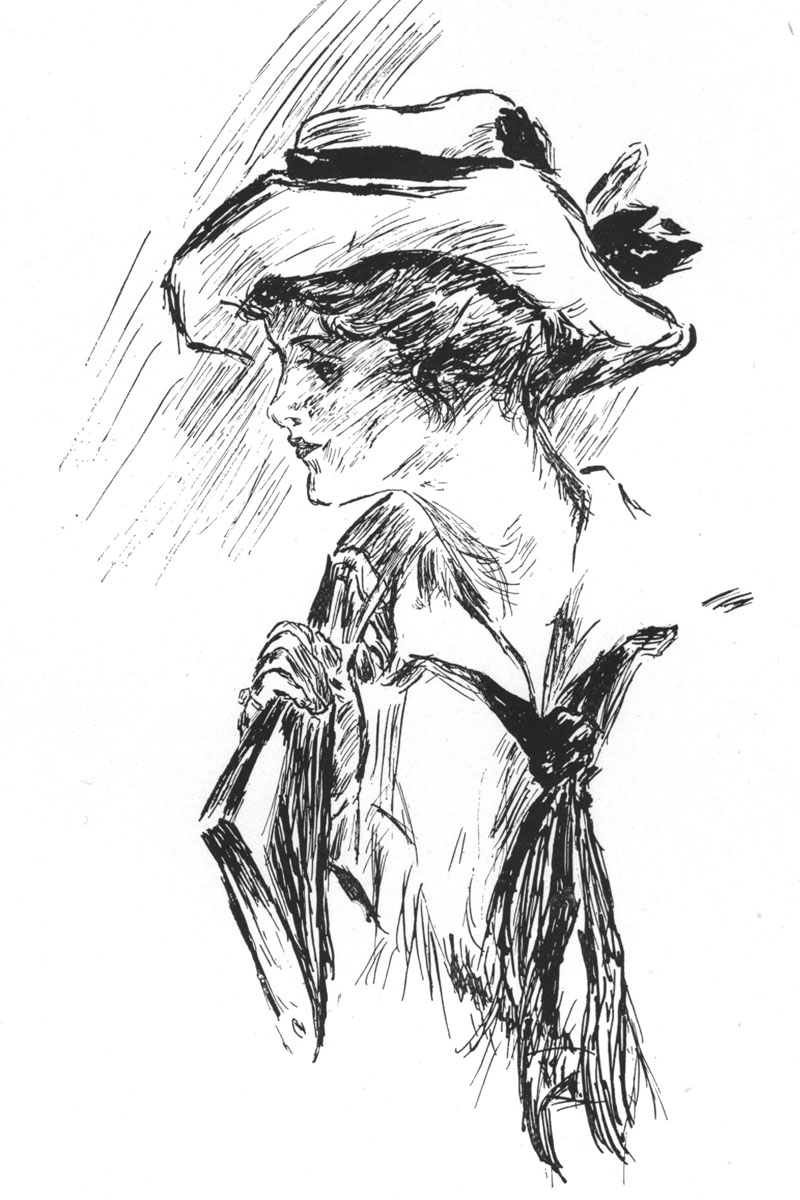
|
1916
|
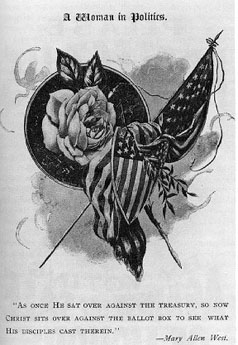 |
Dr. Mary Wolfe gives a talk on women's suffrage at Bucknell. She suggests the slogan, "Every man at Bucknell for Suffrage," patterned after the Swarthmore College motto. After talking to the Bucknell women, a suffrage club is founded on campus to "promote equal suffrage sentiment among college men and women." Dagmar James, Class of 1918, is elected to be the first president. The Bucknell Women's Journal, May 1916 |
|
1916
|
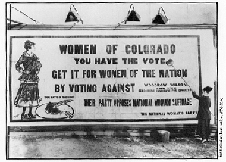 |
Anti-Wilson billboard (1916)The Woman's Party campaigned against Democratic candidates in those states which had already granted women the right to vote because of the party's refusal to support the Nineteenth Amendment. |
|
1919
|
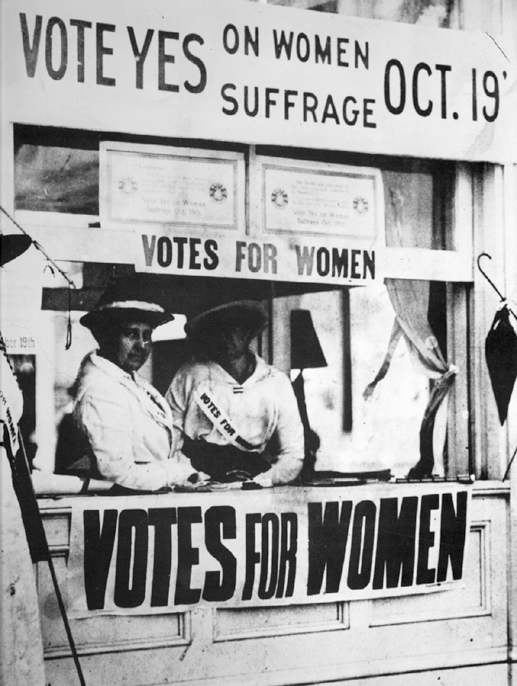 |
Mrs. Emma Matlack gives an address to the fiftieth reunion of the members of the Female Institute Class of 1869. She says, "Women of our land will be full citizens of the United States, and now whatever a woman proves herself able to do, society will be thankful to see her do it, just as if she were a man. If she is scientific, science will welcome her. If capable of political thought and action, women will obtain even that." Her prediction came true, in part, when the 19th amendment was passed the following year and women obtained the right to vote. Kalp |
|
1919
|
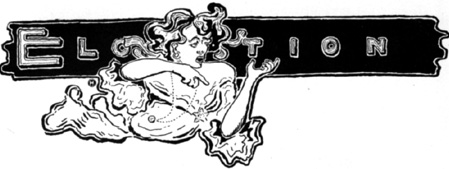 |
The Elocution department was established at Bucknell University twenty-five years ago with Miss Edith Hedges as the first instructor. The aim of the department is to develop grace and ease, a pleasing voice, clear articulation, and correct enunciation. Selections from our standard authors are studied and recitals are held twice a month in which the students appear before the class and an invited audience. This work is designed to test the progress of the student in the regular class work and afford opportunities for platform practice. 1919 L'Agenda |
|
1919
|
|
FROSH RULES A Few Items of Extreme Interest To New Men. 1.Freshmen must attend all mass meeting and cheering practices. 2.All Freshmen must wear blue skull caps with green buttons, black ties and socks, every week day for the college year, except to the Junior Prom and College Girl's Reception. They shall not wear derbies during the college year. Underclassmen will not at any time appear without headwear. 3.Freshmen must at all times salute members of the faculty and must show due respect to upperclassmen. 4.Freshmen must not smoke cigarettes in public and must not smoke at all in the halls or on the campus. 5.Underclassmen must not loiter around class memorials and steps, and the entrance to main college. 6.Freshmen, except in company of an upperclassman must not be seen on the streets with a young lady before Washington's Birthday. (Wives and sisters excepted) "Fussing" was allowed at college functions*, including athletic contests, but calling at the Seminary or in town was forbidden before Washington's Birthday. 7. Freshmen must not cut across the campus or athletic field. 8. Freshmen must speak to everybody at all times. 9. Mustaches are a Senior privilege. 10. Freshmen are not allowed to fuss before Washington's Birthday without upperclassmen, except to frat dances and dinner parties. Caps however at all times must be worn. 11. Freshmen are not allowed to wear sweaters during class hours, 8-4:30. Hikes, skating and canoeing excepted. 12. Freshmen are not allowed to wear any Prep. or High School insignia. 13. All new students not having full Sophomore standing, who have not served at least one year under Freshmen Rules at some college, will be governed by these rules. 14. These rules and college customs will be rigidly enforced and any person violating them will be dealt with according to the regulations of the Senior Council . 15. All Upperclassmen and Sophomores are urged to make a specific report of all violations of the above rules to members of the Senior Council. By Order of Senior Council. Bucknellian, September 30, 1919 *image scanned from L'Agenda 1923 * fussing refers to the act of 'going steady' |
|
1919
|
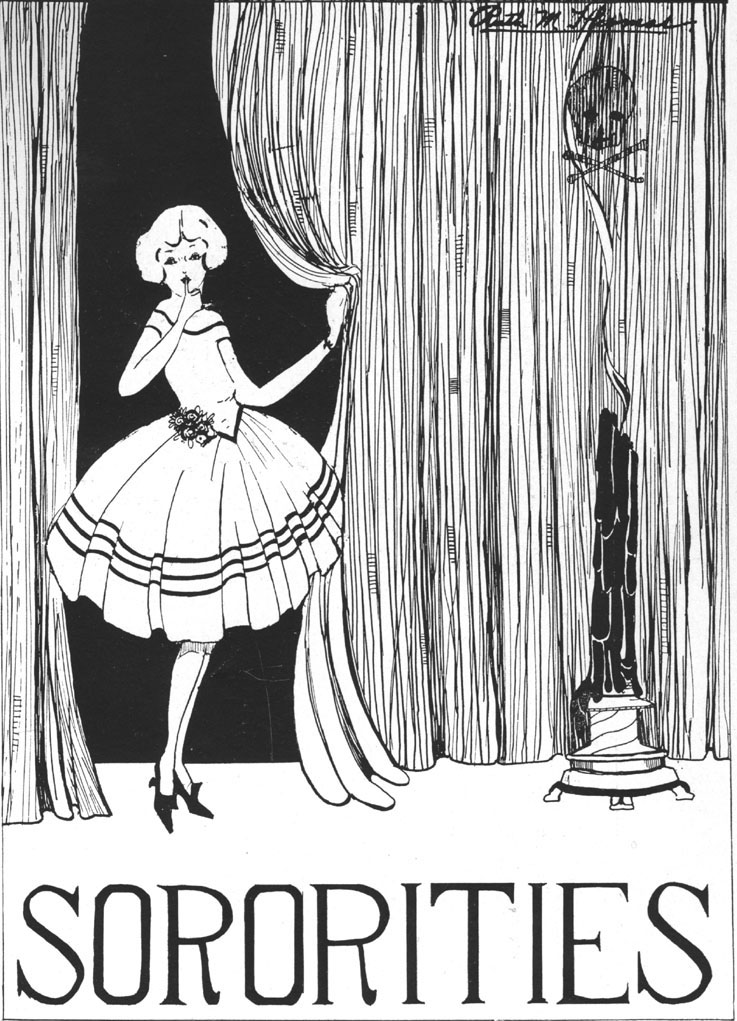 |
Since 1919, the social Greek-letter sororities have increased in number from three to eight, of which seven are nationals. Bucknell has Alpha Chapter of Sigma Sigma Delta, which has become a national organization with open membership as its fundamental principle. This image was scanned from the 1923 L'Agenda Memorials of Bucknell University, 1919-1931 |
| 1919 | 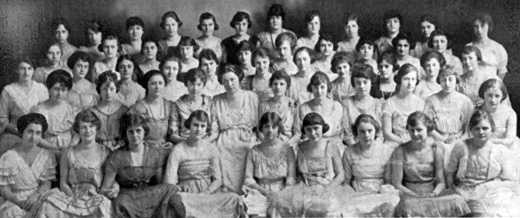 |
"On looking over the L'Agenda of the Class of 1905 one finds a picture of a Girls' Glee Club of Bucknell University. Whether this organization has been lost, forgotten or deliberatley exterminated we cannot say, however, in October 1919, under the leadership of Miss Schultz, it was again organized and at the present time is doing very credible work. We ask your support that the Glee Club of the girls, by the girls, but not for the girls, shall not again perish from Bucknell." Text and image are from the 1921 L'Agenda |
|
1920
|
Bucknell opened with a record enrollment of 850. Following World War I, there was an influx of students, returning soldiers, and children of the newly rich. Tuition and room rent for men was advanced to $110 a semester. The charge for women, which included board, was raised to $225 a semester. As pressure for admission continued, homes on Sixth Street - Bower House, Wolfe House, and others - were purchased or rented to accommodate women students. Theiss |
|
|
1920
|
 |
The sentiment of the time is evident in the board of trustees meeting minutes for June 15: "RESOLVED, That the Board of Trustees looks to the Faculty of the University to govern and maintain order among the undergraduates, in attendance upon the School, and that the Board of Trustees does not favor the present attempts at student self-government either amongst the men or amongst the women in attendance upon the Institution; and that the Board requests the Faculty at once to promulgate proper restrictions for the women in attendance upon the Institution and under its care, including restriction of the hours during which men and women, students of the University, may mingle socially; and a restriction which prohibits its College women from leaving the College Campus and buildings after seven o'clock in the evening, except for business (with permission of the Dean of College Women), and to attend social gatherings held with the sanction of the College authorities, and then only when properly chaperoned." At the same meeting, the board unanimously votes to install steam heating in Wolfe House at a cost of approximately $1000 and to build one fire escape to the house for $800. This same fire escape will become infamous for its use by seminary women sneaking out after the afore said curfew. Trustee Meeting Minutes, 6/15/20 |
| 1920 | Suffrage Victory (August 26, 1920) Alice Paul unfurls the "Ratification Flag" with 36 stars, celebrating the victory of the Nineteenth Amendment granting full voting rights to women throughout the United States. | |
| 1921 |
Junior Prom is held on Friday evening, April 28, from 8 p.m.-1 a.m.
It will no doubt be of interest to all dyed-in-the-wool fussers to know
that "Sem" girls will be allowed to attend the prom for the
first time. President Hunt and Dean Carey have graciously consented
to permit "Sem" girls to attend, but under certain conditions.
And the conditions that they have named are fair. It is up to each and
every person who attends to take it upon themselves to see that these
conditions are carried out. Future proms will be either made or broken
on the record of this one. In other words, this prom will be "on
trial" for future proms. The committee promises that they will
engage Waring's, the Mason-Dixon Seven, or some other orchestra of equal
grade. Bucknellian, 1921 |
|
|
1921
|
Recollection In an interview conducted by her grandson, Assistant Professor John Rickard of the Bucknell English Department, Ada Thomas Rickard '21 recalls, "There was a whole women's college. The Women's Seminary was the name. I don't know whether it's still the women's department, still a separate place. It was a lovely place to be. Because there was no dormitory for the women in the music department, I lived in Wolfe House. There were many more men than women at Bucknell. But I lived in Wolfe House which was right across from the Sem, and I've forgotten what they called that, but it was very nice. This is nothing that would be of interest to anybody else -- but our boyfriends used to be very nice because we lived on the first floor. And, they'd come around and knock on our windows and say 'would you like anything from up at the deli?' and they would go up and get sandwiches. We had a good deal. " Ada remembers one night she and two friends went out and made fudge in the graveyard. "I had read somewhere about some girl that had done it, I think, and I thought, 'Well, that would be fun!' And, this one night, I don't know how we got over there, but we went out, and all of a sudden it seemed like a good idea. So we said, 'Let's go back and get some things for fudge.' So we got the things for fudge, and went and made the fudge in the mausoleum. We took the sterno, and it was quite a blaze we had. There were three of us. If I was scared, I don't remember. I thought it was a great idea, great fun. I think I was a little . . . not frightened, but I was aware that this was a very strange place and I shouldn't be there. We didn't hurt anything, and I think we took all of the sterno things away." "We got back to our room, and it was the night of the freshman/sophomore Phi Bowl. Well, the boys came around to our window and asked us if we would make a flag. They didn't have a flag, so we made a flag, and I remember the freshman won. We were freshman. We gave them the flag, and they raised it, and the freshman won." Interviewed by John Rickard This image is from the 1914 L'Agenda |
|
|
1922
|
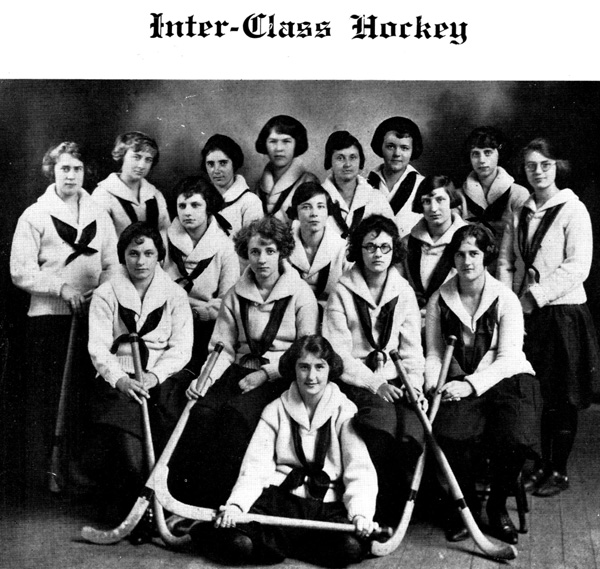 |
The Women's Athletics Association, so long a fancy of our campus activity, has proved itself a reality in the past season. The new spirit for athletics which has been built up among the girls is largely due to the persistent efforts of the new physical director, Miss Agonies MacCann, who received her preparation for gymnastic work in New Haven and was but lately a director at Ursinus College. Hockey is one of her innovations which has met with distinct favor among the co-eds and bids fair for inter-collegiate matches in the fall. The men students laughed, the unathletically inclined jeered and whispered, the towns-folk smiled and wondered but the populace soon learned that sticks and shin guards were here to stay. Now, most any fall afternoon one may hear shouts of "Play ball!" or "Sticks on Q!" in the near vicinity of the proposed stadium. Basketball teams are being whipped into action representing the dormitory divisions of the Women's College and enthusiasm is strongly in favor of inter-sorority matches. The girls have hitherto frowned on basketball as played under girls' rules but this year with the ban removed they have developed into some swift forwards and accurate foul shooters which might stump even the Varsity Quintette. Tennis is by no means a minor sport in girls' athletics. The annual spring tournament is placed on a competitive basis, each contestant playing in the preliminaries according to the schedule which is made out by those in authority. This method of elimination has proved to be very effective in ascertaining the personnel of the finals. Last season the tournament was watched with great interest as each contestant was chalked up, and the only certain thing about it was that "Kate" Owens would win the Junior championship and Alice Stokes the Sophomore honors unless something very unexpected happened. And in addition to this prophecy proving true Alice Davis came our victorious as the Freshman champion. In view of this banner year in women's athletics the girls are voicing unstinted praise where it is surely best merited upon our enthusiastic physical director. The plans and efforts of the department culminate in the annual May Day celebration which is especially looked forward to as disclosing the "fairest of the fair" to be crowned by an adoring circle of spring revelers. L'Agenda 1923 |
|
1922
|
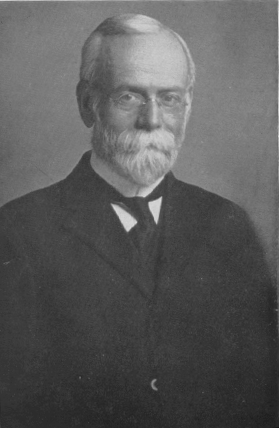 |
"After a prolonged illness, Professor William E. Martin died on May 20, 1922 and his daughter, Eliza J. Martin succeeded him as librarian without any teaching obligation. except for Isaac N. Hill, who had served ade facto for a few months, she thus became the first full-time librarian of Bucknell University. Like all her predecessors, she was not fully trained in librarianship, and she had acquired little experience of the work of a librarian, but she set herself with great enthusiasm and with considerable understanding to the prodigious task of making the library serve the needs of the University in a time of its hitherto unprecedented growth. "During the year 1922-23 the central library was open daily (Monday through Friday) to all students from 8:00 am to 5:30 pm, but to men only from 7:00 pm to 10:00 pm. [Eliza J. Martin, Report May 31, 1923, p2.] It was closed from Saturday noon until Monday morning. Apparently this schedule was maintained throughout the year 1929-30. On March 5, 1930, the faculty voted that the library should be open on Saturday afternoons for the same number of hours that it was open on other afternoons, and at the same time, it requested that the library be open on Sunday afternoons "as soon as arrangements. . .[could] be made" to give such service. The response of the librarian to this request, a response made in June, 1930, was that, thus far, no demand from students for such a concession had been made, but she was persuaded, nevertheless, that such service could not be much deferred. The deferment was indeed short, for a year later she reported to the President a the Board of Trustees that the library had been opened for two hours on Sunday afternoon "with gratifying results." Oliphant |
| 1923 | Frosh Girls To Wear Green Bibs | |
|
1923
|
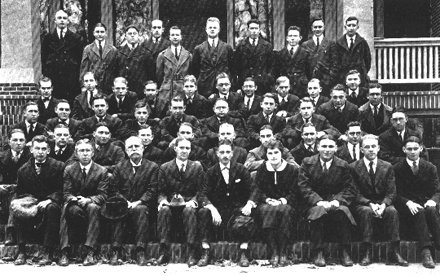 |
Katherine Lucille Owens becomes the first woman to graduate from Bucknell with an engineering degree. Daughter of Professor Owens, an 1880 graduate, Kate majors in Chemical Engineering, a program her father helped to develop here. She serves as secretary and treasurer of the Chemical Engineering Society and is also an active athlete, playing on the tennis and basketball teams. As a pioneering woman in a traditionally male field, Kate endured instructors pulling pranks on her, male classmates brewing beer in the lab during Prohibition, and a professor banning her from a mechanical engineering class. Public Relations, The Lewisburg Daily Journal, 2/18/94 |
|
1923
|
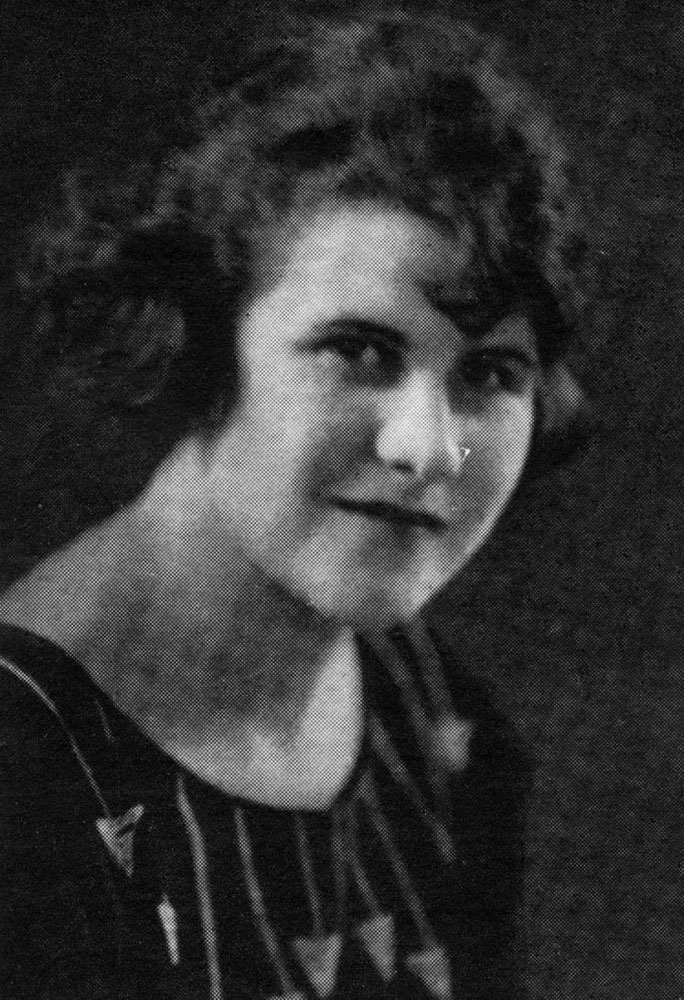 |
KATHERINE LUCILLE OWENS "Kate" "K" We're mightly glad that "Kate" decided that her own home college was good enough for her and that she came back from Denison to join the class of '23. She's a regular all-round girl, and brings credit to us in many ways, but it's in athletics especially that she shines. Not many can equal her in tennis or basketball, and as for swimming, skating, hiking, and all the out-doors - boy, she's there! It's quite unusual for a girl to take the Chemical Engineering Course but that's what "Kate" is doing, and making good at it, too. She is as fond of a good time as any other co-ed. We feel sure that in her career as a chemist "K" will win out as she always does, and we wish her the best of luck. L'Agenda 1923 |
|
1923
|
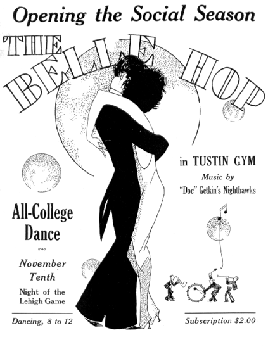 |
The Belle Hop, a humorous magazine by Bucknell students, begins publishing seven times during the college year. Since its founding "it has steadily increased its circulation and has taken its place among the leading humorous magazines of the East. It is a member of the Eastern Association of College Comics. Staff positions are on a competitive basis." Among the writers are Miss Phoebe Reinhart, and Mrs. Yolanda, and Frank Meador. Many of the jokes contained seem to make the college co-ed the target of humor. In the Depression, the student publication goes into debt and the last edition of The Belle Hop was in 1933. That year a publications Board is formed to control student journalism and supervise financial operations of student publications. L'Agenda1931, Theiss |
|
1923
|
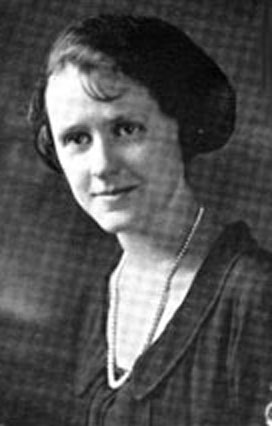 |
Anna Marie Fisher We don't need to guess a second time who is talking when we hear this. It is our "Ann." "Ann" came to old Bucknell from Reading, and nearly deserted us once to go back there. We are mighty glad that she changed her mind and returned. Everyone in school knows "Ann" for her cheery voice and pleasant smile. There are few things this little girl from Reading can't do; she can sing, play, dance, and of course, get good marks in her studies. Is she kind-hearted? Yes indeed, for when a certain "Wolfe" knocks at her door, she always lets him in. You will always see "Ann" in the midst of all the fun and gaiety at the "SEM", where she is a prominent member of the "Klu Klux Klan" of first floor New. L'Agenda 1923 |
| 1923 |
Athletics at Women's College The Women's Athletic Association, so long a fancy of our campus activity, has proved itself a reality in the past season. The new spirit for athletics which has been built up among the girls is largely due to the persistent efforts of teh new physical director, Miss Agnes MacCann, who received her preparation for gymnastic work in New Haven and was but lately a director at Ursinus College.
|
|
|
1924
|
 |
Recollection Helen Fairfax, Class of 1924, is one of the first black women to graduate from Bucknell. Bucknell records are unclear about who may have been the first African-American alumna. In an interview with WRC Intern, Tameka Brooks, she recalled being the only black student on campus when she first came to Bucknell. Everyone was very nice to her. She didn't think there were any other black women before her, but there were a couple a few years later. Helen commuted to Bucknell from Williamsport. The 1924 L'Agenda describes Helen as "a friendly girl, a jolly companion, an excellent student, a commuter who is always on time--that's Helen. She carried off second honor in her class in high school and is keeping up her good record here at B.U. She is preparing to do Y.W.C.A. work in the south." L'Agenda 1925, WRC Interview |
|
1924
|
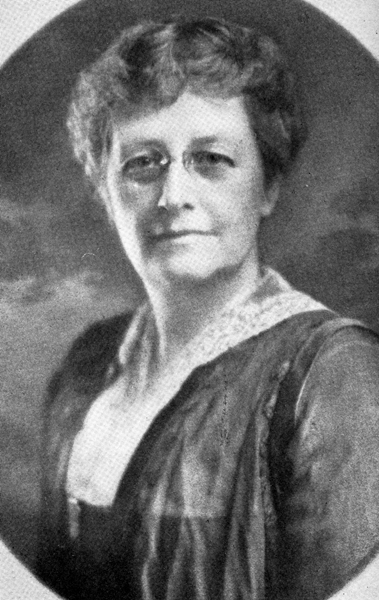 |
With the rapid growth of the University, and the coming of many new teachers, it became increasingly difficult for faculty members to know one another. It was even more difficult for faculty wives to become acquainted with one another. The faculty receptions, given annually by the President and Mrs. Emory W. Hunt, for the introduction of new teachers and their wives, helped to break the ice; but the feeling arose that some more intimate avenue of acquaintanceship was needed. This resulted in the formation, in 1924, of an organization for faculty wives and women, called the Campus Club. Mrs. Hunt became and continued its president. Memorials of Bucknell University, 1919-1931 |
|
1924
|
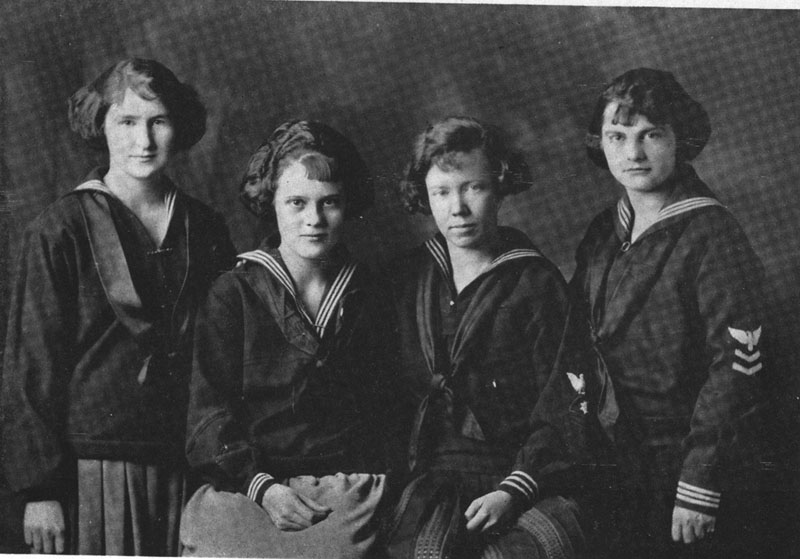 |
Girls' Athletic Awards The Women's Athletic Association has devised a point system whereby those especially inclined towards athletic enterprises may be justly rewarded for their industry. The summary of points states that one hundred points shall merit the class numerals and five hundred points shall win the highly prized "B". The requirement for hiking numerals is sixty-eight miles a semester, this amount to be taken in hikes of not less than five miles each. A place on either the class basketball or class hockey teams merits one hundred points and sub position fifty points. Tennis champions are awarded one hundred points and track positions a like amount. The following is a compiled list of numeral awards for the past semester: HIKING TENNIS BASKETBALL |
|
1924
|
|
A Coed's Reflections of Bucknell in "The Twenties"
Freshmen were assigned sophomore big sisters by the Dean of Women. They wrote to us before we entered in September and took us to help register with the dean on the hill. My big sister was Caryl Dutton Slifer '27, who remained my good friend near my home in New Jersey. Random memories of my college years, 1924-1928, include clothing and hair styles, foods, social life and friends. Girls' apparel was surely different in the '20s: no jeans or slacks, long coats to keep knees warm, long cotton lisle stockings often designed with various patterns, hair worm straight or pushed in finger waves, very few permanents. NO cars were allowed until our senior year, and there were very few on campus. Girls would often walk downtown in the evenings but were required to be back on campus by 9 p.m. Between classes on the hill we could buy chocolate pie or large cinnamon buns made by Mrs. Guy Payne in the College Inn up on the quadrangle. Many social functions in the '20s provided excitement: breakfast on Red Rock along the Susquehanna, banquets held in Lewisburg Inn as well as in hotels in nearby Milton, a debutante ball in Germantown, a wedding in Chestnut Hill, engagement parties in Wilmington and Pottstown, and dances, dances, dances. There was the Freshman Hop, Sophomore Cotillion, Junior Prom, Senior Ball, fraternity and sorority dances, the Engineering Ball up on the hill and dances at other colleges with bands, decorations, dance programs, dates and knee length fancy dresses with fringes and ostrich feathers. The Charleston was the new rage. I had four wonderful years at Bucknell and after graduation friendships continued through correspondences and gatherings. Although there were fewer of us each passing year, a number of my Bucknell friends attended our 50th wedding anniversary party in 1981 and my 80th birthday luncheon in 1986. I've been retired for 23 years and a widow for six, but my family tells me that in my heart I never quite left Bucknell. Bucknell World, 10/5/94 |
|
1925
|
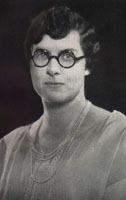 |
Miss Amelia E. Clark received her A.B. degree from Elmira College in 1914, and the following year, her M.A. degree from Columbia. As Assistant Professor of French she taught at Elmira College from 1916 until 1924, when she came to Bucknell. Miss Clark first served as a French teacher before she was made Acting Dean of Women in 1925, and became Dean of the Department of Women the following year. On leave of absence from 1932-33, she studied at New York University. In the fall of 1935, she gave up her duties as a teacher to devote herself entirely to her responsibilities as Dean. In 1936, however, Miss Clark left Bucknell to become dean of a women's college, and was succeeded by Mrs. Dorothy Tunell Dyer. L'Agenda 1935 Theiss |
|
1925
|
 |
Every year since 1925, the women students by unanimous consent observed Golden Rule Sunday by substituting for the usual Sunday dinner such a limited meal as the children in the orphanages of the Near East were obliged to eat daily--stew, cocoa, dark bread with no butter, and stewed apricots. The difference in cost of the two meals was contributed during the first years to the work of the Near East Relief, and for the past three years to the educational work of Mr. and Mrs. Loren M. Reno, in Brazil. Memorials of Bucknell University, 1919-1931 |
